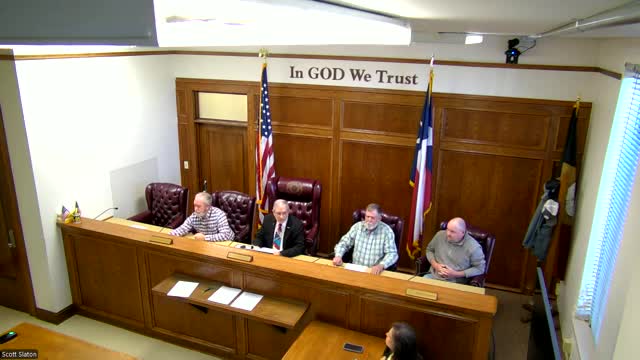Van Zandt County court engages Jackson Walker as bond counsel; financial-adviser choice delayed
Get AI-powered insights, summaries, and transcripts
Subscribe
Summary
Van Zandt County Commissioners heard rival financial-adviser presentations and approved Jackson Walker as bond counsel with a 60-day reimbursement lookback. The court postponed choosing a financial adviser and set follow-up deadlines and meetings ahead of a February election window.
Van Zandt County Commissioners heard presentations from two financial-adviser firms and voted to engage law firm Jackson Walker as bond counsel, adopting a 60-day reimbursement lookback, during a county commissioners court meeting. The court did not select a financial adviser and scheduled further review and a decision at a regular meeting on Jan. 13.
The court approved the resolution to hire Jackson Walker and enact a 60-day lookback for reimbursement of pre-election expenses by voice vote. County officials said the lookback would allow expenses incurred before the formal bond issuance — for example, architect or escrow costs tied to a project — to be reimbursed from bond proceeds if voters approve financing.
Nut graf: The presentations and vote move Van Zandt County closer to formal financing for a jail and possible courthouse improvements. Presenters outlined financing instruments (general-obligation bonds, certificates of obligation, tax notes), timing for a credit rating and market-sell options, and tradeoffs between competitive and negotiated bond sales. Commissioners deferred a decision on which financial adviser to hire immediately and set deadlines for pricing and documents ahead of the February election window.
US Capital Advisors representative Ben Rosenberg summarized credit-rating timing and next steps for a market sale. Rosenberg told the court, “About a month,” when asked how long it typically takes to obtain a credit rating from one of the major agencies.
A second presenter from Government Capital (Government Capital Securities) reviewed bond types and practical choices for counties, including general-obligation bonds (which require voter approval), certificates of obligation (which require published notice and a waiting period), and short-term tax notes. Wade Thompson of Government Capital noted the firm’s prior work with the county and recalled, “The first project was the current jail that is being used. That was back in 2004.”
Both firms described advantages and disadvantages of competitive versus negotiated sales and private placements. Presenters recommended competitive sales for creditworthy issuers seeking the lowest interest cost on a given sale day, while noting market volatility can change outcomes and that negotiated sales offer timing flexibility. They also discussed splitting large bond issues across tranches to reduce interest expense in some scenarios and explained that bank-qualified treatment (issues below a statutory threshold per calendar year) can reduce borrowing costs.
Commissioners emphasized the compressed calendar: the court must call a bond election within an early-February window (discussed in the presentation as a Feb. 3–14 window), and staff said draft pricing scenarios and documents were expected by Jan. 29. Commissioners scheduled a regularly scheduled meeting on Jan. 13 at 9 a.m. to consider adviser contracts and other financing items; several commissioners and staff said they preferred deciding at that regular meeting rather than holding a special session.
On the existing adviser contract, presenters and commissioners confirmed the county has worked with Government Capital since the early 2000s and that the existing agreement automatically renews annually but can be terminated with 30 days’ notice. Commissioners requested copies of both firms’ proposed engagement contracts, fee schedules and sample offering documents before the Jan. 13 agenda.
On the bond-counsel resolution, the court approved engaging Jackson Walker to serve as bond counsel for the county’s anticipated financings and enacted the 60-day reimbursement resolution. The court recorded the approval by voice vote; no roll-call tally was provided in the transcript.
Ending: Commissioners instructed staff to collect the requested proposals and contracts, return both firms for additional questions if needed, and bring financing numbers and the bond-counsel engagement back for formal action at the Jan. 13 meeting. If the court places a bond proposition on the ballot, attorneys and advisers will complete the timetable and documents necessary to call the election and proceed with a sale.
